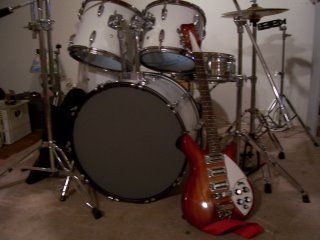Friday, November 18, 2005
For Your Reading Pleasure Books on Recording.
I suggest looking at Amazon (no not tall buxom women) for some books that will help you along the way. Check your local library also. There was also a book that Les Paul published many moons ago about recording. It is well worth a read. Please add more and comment.
Comments:
<< Home
From Pete Townshend's blog today:
For those of you recording at home on a budget there are some ‘advances’ that have made it easier to work, but harder to produce a sound that feels right. For many years if I worked with a computer, or a digital multitracker, I couldn’t bear the edgy over-crisp sound it made when recording things like guitars, pianos and vocals. Good mikes help, as do compressors, but don’t fix the problem. The problem was caused when the CD was introduced and it was decided that a sample rate of 44.1Khz and a resolution of 16 Bits was adequate. It is almost adequate for finished music, but not so good for music in the process of production where I believe a higher standard is required.
This 44.1 format found its way from the domestic CD to home studios where – in my opinion – it is not smooth enough. It is possible to make good sounding recordings on this kind of equipment, but it is very hard work, and I would prefer to work on a cheap multitrack cassette tape machine rather than a cheap digital multitracker even though the latter will do a hundred stunts the cassette cannot approach. I just prefer the sound. That said, I have a Korg ToneWorks, a battery powered and inexpensive 4 track digital multitracker no bigger than a pack of cigarettes, with a built in mike. For getting a song down while sitting in the garden or on on the beach, it would be very hard to beat. This records at only 32Khz/16Bit with MPEG1 compression, but I have to say it sounds pretty fat.
About four years ago in pro studios computers caught up with reality and a sample rate of 192Khz was introduced operating at a resolution of 24 Bits. With high quality front end and output units, a computer can now make recordings that can sound like the ones we used to make on analogue tape. Even so, it is still tricky. Easier to just use tape, if you want the sound of tape. At home I think working at 96Khz / 24 Bits is probably good enough for rock and pop. If I am recording something subtle though, I’ll try to do it at 192. (This uses up a lot of disk space).
A good magazine to read to address the issues from all aspects is called Tape Op. You will find no snobbery about home studios or pro studios – just an obsession with making music sound great and making recording it fun.
Post a Comment
For those of you recording at home on a budget there are some ‘advances’ that have made it easier to work, but harder to produce a sound that feels right. For many years if I worked with a computer, or a digital multitracker, I couldn’t bear the edgy over-crisp sound it made when recording things like guitars, pianos and vocals. Good mikes help, as do compressors, but don’t fix the problem. The problem was caused when the CD was introduced and it was decided that a sample rate of 44.1Khz and a resolution of 16 Bits was adequate. It is almost adequate for finished music, but not so good for music in the process of production where I believe a higher standard is required.
This 44.1 format found its way from the domestic CD to home studios where – in my opinion – it is not smooth enough. It is possible to make good sounding recordings on this kind of equipment, but it is very hard work, and I would prefer to work on a cheap multitrack cassette tape machine rather than a cheap digital multitracker even though the latter will do a hundred stunts the cassette cannot approach. I just prefer the sound. That said, I have a Korg ToneWorks, a battery powered and inexpensive 4 track digital multitracker no bigger than a pack of cigarettes, with a built in mike. For getting a song down while sitting in the garden or on on the beach, it would be very hard to beat. This records at only 32Khz/16Bit with MPEG1 compression, but I have to say it sounds pretty fat.
About four years ago in pro studios computers caught up with reality and a sample rate of 192Khz was introduced operating at a resolution of 24 Bits. With high quality front end and output units, a computer can now make recordings that can sound like the ones we used to make on analogue tape. Even so, it is still tricky. Easier to just use tape, if you want the sound of tape. At home I think working at 96Khz / 24 Bits is probably good enough for rock and pop. If I am recording something subtle though, I’ll try to do it at 192. (This uses up a lot of disk space).
A good magazine to read to address the issues from all aspects is called Tape Op. You will find no snobbery about home studios or pro studios – just an obsession with making music sound great and making recording it fun.
<< Home

